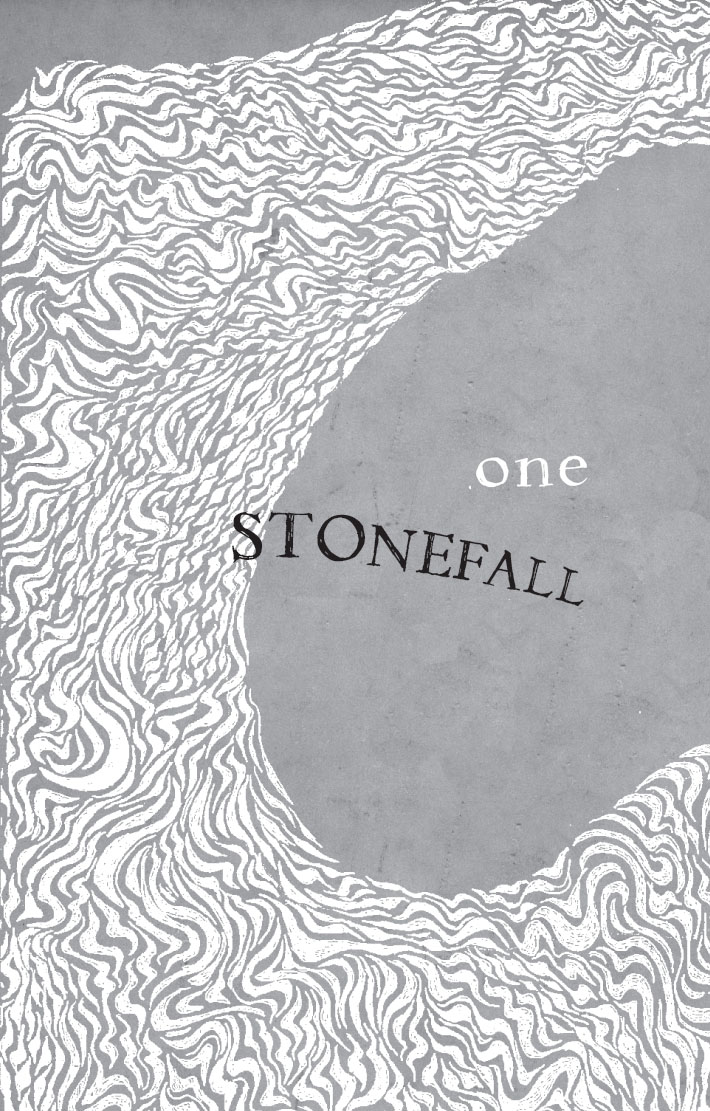

 1
1 
Once there lived two brothers in a cottage in the middle of a vast bare plain. Their names were Zluty and Bily. Both brothers had the same grey eyes and pink cheeks, the same small black noses and round ears with just a hint of pointiness in them. But Zluty’s fur was yellow, and Bily’s was white and soft and his tail was longer.
Bily was rather timid. He was also patient and very good at coaxing to life the seeds brought to him from afar by his bird friends. He spent each afternoon in the vivid garden he had wooed from the hard stony earth of the plain. As well as a wild confusion of flowers, there were many bushes and plants that produced fruit or vegetables. Bily would gather these and make delicious jams and preserves and sauces, or he would dry them. These were important to the brothers, for Winter on the plain was long and harsh and nothing grew.
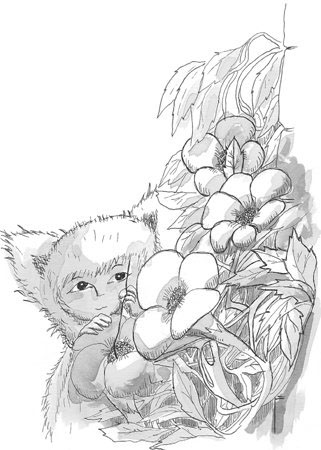
Bily loved his garden and he loved cooking but most of all he loved the sturdy cottage that he and Zluty had built. Its walls were made from stones of various colours and sizes gathered from the plain. Its roof was made of tough grass woven into tiles laid over thick pieces of wood. The tiles were bound together so that they fitted tightly against one another, and on the rare occasions when it rained not a single drop leaked through. Inside the hut was the small stone oven where Bily baked bread and pies. In Winter he and Zluty would sit close to its open mouth and warm their toes and fingers while the icy winds blew outside. Bily loved the oven and his small bed in its nook by the window, and the wooden table and two chairs that Zluty had made for them to sit on when they ate. But best of all he loved the big cave under the cottage, which served as a cellar.
Here, all the pots of preserves and jams and chutneys he made in Summer and Autumn stood in rows alongside urns of honey, bales of sweetgrass, woven sacks of grain and rice and flour, and great mounds of ground cones. There were two neat doors in the floor of the cottage that opened to reveal the steps they had dug down to the cellar. There was a second entrance outside the cottage, with a ladder, but they usually only used this for big or dirty things that could not be brought through the cottage.
Bily sometimes went down to the cellar just to look at everything that he and Zluty had so carefully prepared for the Winter to come, and to admire his store of seeds and bulbs. Occasionally, he would open the stopper of one of the urns of honey, or the smaller jugs of tree sap, and smell the richness that flowed out into the air. Then he would press the stopper back into its place and give a great sigh of pleasure at how wonderfully safe it all made him feel.
Zluty also cherished their cottage and its well-stocked cellar, but what he loved most was to think about the immense and mysterious forest that grew at the northern edge of the world.
Bily had never been to the Northern Forest, but Zluty made one long journey there each Autumn to gather mushrooms and tree sap and honey. It took four days for him to reach the edge of the forest, two days to forage, and four days to return. Zluty knew his brother worried about him the whole ten days he was away. No tale he had ever told about the wonders of the forest or the pleasure of camping out on the plain could reassure Bily. When Zluty spoke of how beautifully deep and mysterious the forest was, Bily thought only of how it would feel to be lost in the trackless, lightless darkness beneath the dense canopy of leaves and branches. And what if Zluty never found his way out of the forest again? Or what if he did, but he came out the wrong side. What if, in his eagerness to get back into the light, Zluty rushed out and fell off the edge of the world?
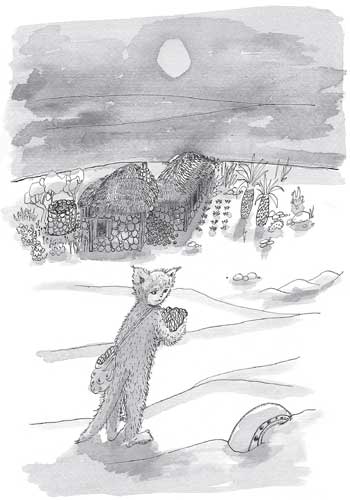
However, Bily knew that they needed all that his brother brought back from the forest if they were to survive the long hard Winter, and so he tried not to talk of his fears.
Fortunately, aside from this one long journey, the other foraging trips Zluty made were shorter, the longest taking him away from the cottage for only two nights. There was a patch of deep flavourful orange roots that grew a day away from the cottage to the East. When these were in season Zluty would go and dig up enough to thicken stews and soups and to flavour bread for the whole Winter and drag them back to the cottage on a wheeled pallet he had made out of a piece of the egg that he and Bily had hatched from. Zluty always managed to return before dusk on the third day, despite stopping on the way to cut a load of sweetgrass to refresh their mattresses.
A day to the South of the cottage was a field of the tough grass they used to weave roof tiles for the cottage. Zluty harvested the grass in mid-Autumn so that he and Bily would have enough time to weave the tiles and replace any that had become thin or ragged before Winter.
A half day South beyond the tough grass was a crop of wild rice. It grew in a patch of rare swampy ground on the bone-dry plain, and was inhabited by clouds of biting insects. To gather the rice, Zluty had to rub mud into his cheeks and hands to stop the insects biting him, and when entering the swamp he had to be very careful not to step on the blackclaw nests clustered all around the edges of the swamp. But the worst part was that he had to wade into black muddy water that reached right up to his middle.
A further half-day’s walk was a field of wild wheat where Zluty harvested grain to grind into the flour Bily used to make bread and pancakes and pie crusts.
Not far from the wheat, to the East, was a wide field of sharp, unfriendly plants with prickles and fat bulbs that burst open at the end of Summer to reveal tight balls of white fluff. Zluty would gather the fluff balls into enormous light bales, and bring them back on his wheeled pallet for Bily to tease into fleece and spin into thread. During the long Winter he would weave the thread into cloth, or make it into felt for floor rugs.
Bily had tried to grow all of these wild crops in his garden so that Zluty would never have to travel away from the cottage save once a year when he went to the Northern Forest. But they did not prosper. Bily wondered if perhaps the foreign seeds that the birds had brought him had changed the earth about the cottage so that native plants and grasses would not grow there. Or maybe the wild seeds did not like to be captured and planted in a tamed patch of earth.
Whatever the reason, Bily had to accept that the trips Zluty made were needful. The truth was that Zluty loved to tie his purple travelling scarf about his neck, shoulder his pack and set off across the plain. This might have saddened Bily, except that Zluty had once told him that he loved the cottage and its garden most of all when he was returning to it from a journey. He would first catch sight of it rising in a little hump from the flat plain, with a smudge of smoke above its chimney stack, and his heart would give a bound of joy. If it was dusk, he would see the light from the little lantern Bily always lit and stood it in the window after the sun set, facing the direction he had gone. Seeing it shining to welcome him, Zluty said his heart would ache with the gladness of coming home.
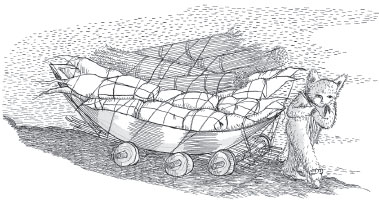
The life lived by the two brothers was very full and busy. As each season came and departed to give way to the next they always knew exactly what they had to do. This order and sameness was at the heart of Bily’s contentment, and although Zluty loved to discover new things, and there were times when he dreamed of the deep and alluring mystery of the Northern Forest, he too was content with their lives. So day followed day and season followed season for many peaceful years and the two brothers went about their tasks without either of them having any desire for change.
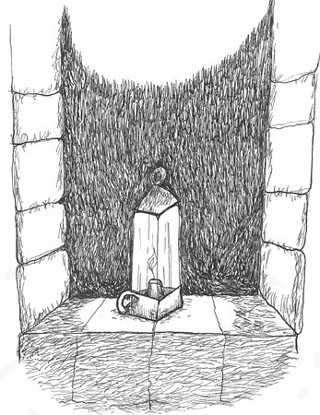
Yet change will come, whether it is wanted or not, and so it was that one morning on the day Zluty was to make his annual journey to the Northern Forest, change began to shape itself over their very heads.